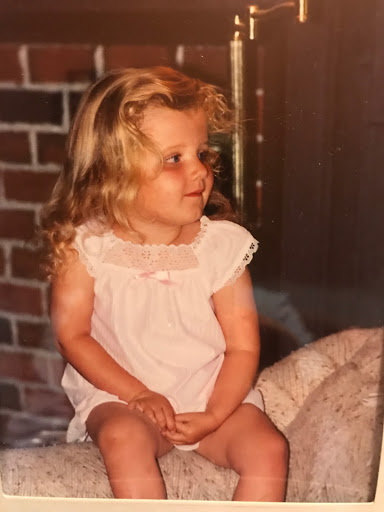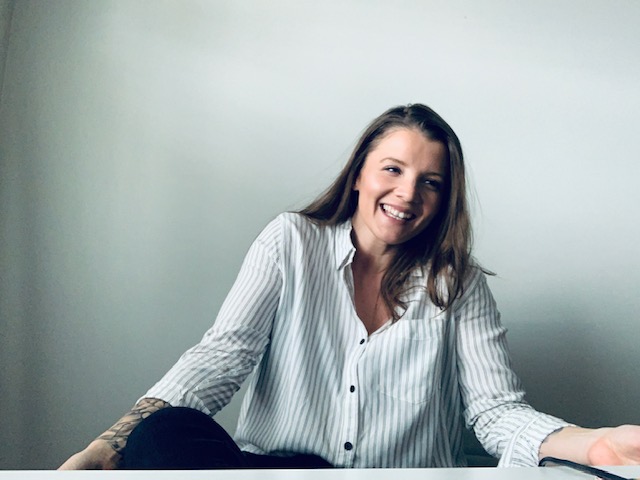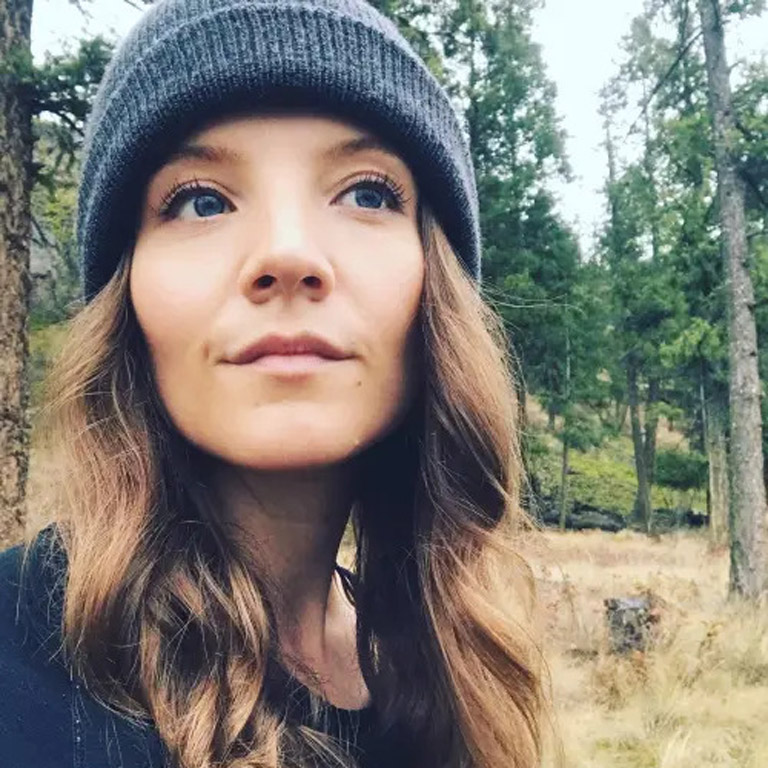By Kate Belton
@k8beee
I have struggled with my body image and self-esteem for as long as I can remember. As a kid I was bigger than other girls, and I believed I was at fault for my size because I liked food too much. By age 12 the war within me had started: I was too much, and that meant I was not enough.
I’d wake up and promise myself that “today would be different.” Today, I wouldn’t eat anything “bad.” Today, I would stick to 500 calories. I would starve myself for as long as I could, and by the end of the day I would be binge-eating whatever I could get my hands on. After a binge I would be filled with shame and regret, and the feeling of failure and self-loathing would grow inside of me. All I wanted was to be thin and beautiful, but I couldn’t seem to make myself stick to a diet that would get me there.
When I was 14 I found something that could relieve me from the discomfort I felt in my own body: booze, baby. The first time I binge-drank was at a bush party in grade nine. When I was drunk, I had no body issues, no insecurities. Each drink seemed to transform me into someone beautiful, funny, magnetic and worthy and I loved it.
I knew the first time that I ever got drunk that the way I drank was different. I knew that I had just made a new best friend. I was not an “I’ll bring a 6-pack and we can share it” kind of girl. I was an “I brought 2 bottles of wine, what are you guys gonna drink?” kind of girl. I was infatuated with the person drinking turned me into. But with every Sunday morning, my self-loathing grew, because now not only did I despise my body, but I also had no memory of the things I’d done or said the night before, and hated myself for that, too.
My drinking matched my insecurities in university. There were so many skinny, pretty girls at my school and I was just a chubby farm girl. I spent more time comparing myself to the other girls in my classes than I did listening to my professors. I could only stand to be around myself when I was drinking, so I drank any chance I could get.
By second year I had gained a lot of weight. I started smoking cigarettes, I wore Spanx and corsets under my clothes, and way too much makeup. I took diet pills, put weird drops in my drinks, tried meal replacement shakes and bars. I starved myself, and would drink on an empty stomach, and then become an insatiable monster when I was drunk and wake up caught in the leg-trap of self-loathing again.
After university, I got jobs where I could drink multiple nights a week without any real consequences. I was this extrovert party girl who made instant best friends with people I couldn’t remember the next day. These strangers always seemed to remember me or something outrageous I had done the night before. I was the last to go home; I never wanted the party to end. I had a “look” I could do at bars to get guys to buy my friends and I drinks all night (I actually wish I still knew how to do this look but for more practical things like groceries or good parking spots). The boyfriends I had during those years were drinking-buddies who would tell me I was beautiful even though not one ounce of me believed them.
In the morning I was an awkward and subdued introvert who just wanted to disappear. When I wasn’t drinking I felt like a mall Santa on break, with my fake beard pulled down around my neck. I was just a sad, phoney Santa. I would lay in bed, consumed by hangover guilt and shame, physically ill, and angry at myself for losing control again.

In the throws of these shame-spiral hangovers, I would hear a faint whisper from the substructure of my heart saying: “This isn’t the life I want. I can do better.”
I would write voraciously in my journal about how disappointed I was in myself for whatever I had done the night before and vow to get my life on track on Monday. I started making similar promises to myself about alcohol as those I would make about food. “Ok, I am only going to have two drinks tonight” or “I’m only going to drink once a week now.” I would make it a couple of days, and the cries from within me would grow softer, with each “come on, I’ll buy the first round” or “just come out for one drink” until I would stifle them completely with my justifications that I was young and deserved to have fun. Each broken promise sent my self-respect plummeting even further towards non-existence.
I tried to cure myself geographically, by picking new cities to move to where I would plan to “start fresh.” In the span of five years I travelled to Australia, moved to Toronto, then Kitchener, Ontario, then to Vancouver, BC, and then to Kelowna, BC. Each move was coloured rosy by the prospect of starting over somewhere new. But as desperately as I tried to outrun them, my patterns of self-destruction kept perfect pace. It was never long after I’d settled in a new city that my habits would come creeping in.
Each new place I landed took me further away from my parents and anyone who’d known me before I’d abandoned my authentic self for this party-girl charade; and with no one to call me on my bullshit, it was easier for me to spiral further downward. I would go out for drinks to make friends, and they would learn I was a fun, self-deprecating barfly who always had an extra cigarette and an excuse to drink on a weeknight. I had many superficial friendships and relationships founded on my own aversion to being alone with myself.
By my late twenties, the negative impact my drinking was having on my life was becoming impossible for me to ignore. I was over-spending, eating terribly, blacking out, and subsequently losing days and days to hangovers. I almost lost a couple of jobs, hurt people that I loved and was completely tapped-out of self-respect. Not knowing how or when I had gotten home the night before was normal for me. I was never a daily-drinker. I have never identified with the term “alcoholic.” But the whisper telling me that my life could be better was turning into a roar with each hangover I endured.
I have journaled regularly since my early twenties. In countless entries I would berate myself for needing to lose weight, to quit drinking, or a combination of both. On September 9th, 2017 I got drunk for what would end up being the last time, and spent the following three days hungover.
It wasn’t until the evening of that third day, that I realized the first thing I needed to quit doing was being so goddamn mean to myself. Surely I was not the only person in the world to be struggling with alcohol abuse and self-esteem issues.
That night, in an act of self-preservation, I reached out to an acquaintance I looked up to who I knew was in recovery. He assured me that my life was about to get so much better but that it was going to take some hard work. He listened to me, and encouraged me to go to an AA meeting. When I voiced my concern to him that the people in AA would judge me, he told me that “no one walks through the doors of AA because they’re killing it at life.” He told me there’d be a mix of beautiful people and trainwrecks, just like at a bar. He said “take what you need, and leave the rest.”
The next day I wrote this in my journal:
“September 12th, 2017
Today is an interesting day, For the 1000th time I want to quit drinking. I am listening to a Recovery podcast, I called and told mom I want to quit drinking, and I’m going to an AA meeting tonight. I am sick of hating myself. I want to like and respect myself. I want to have a clear conscience and I want to enjoy my life and be successful. I’m exhausted. I’m spinning my wheels in a mediocre life.”

As a result of my final blackout, my relationship was hanging on by a thread. I had to break down and admit to my boyfriend (who, weirdly enough had never touched alcohol in his life) that I couldn’t fight myself anymore. I wept as I told him I needed to change my life, and that it started with stepping into a room full of strangers and admitting I had a problem with alcohol. He was as kind, and as compassionate as he could’ve been, considering his lack of experience with the demons I’d shown him. Together, we went to my first AA meeting. He walked me to the door, gave me a big hug, and I turned and pulled open the heavy door. I had to do this part on my own. And it was in stepping through that door alone that I realized that I am the only person who can truly fight for me.
I followed a hallway marked with small, inconspicuous “AA” signs to the meeting room, and it was just as I had imagined it would be: a couple of semi-circle rows of mismatched plastic chairs occupied by strangers of equally mismatched shapes, sizes and ages. Everyone in that room was a stranger to me, but somehow felt oddly familiar. I sat down between two women, and immediately started to sob. I was hit by a tsunami of emotions, the moment my body sank into that seat. I was simultaneously shocked and relieved and grateful to have taken this huge step for myself. I felt like I had failed at being an adult in society because I couldn’t drink “normally.” I was terrified of what my future would hold without the best friend I had been clinging to for my self-confidence for the past 15 years.
I cried for the entire one hour duration of that meeting. From start to finish, I went from bawling, to softly weeping, and the moment anyone would look at me and say “I’ve been where you are, it gets better” I would go right back to ugly crying. The lady beside me held my hand as I wept.
I wrote in my journal that night that at that meeting I felt like a baby elephant that the herd stands in a circle around when danger is present. I was the only first-timer at that meeting. Each person saw my pain and stood strong in their sobriety, offering their guidance and gentle support to me with each story shared and knowing look cast my way. I had finally surrendered.
I attended meetings regularly throughout my first year of sobriety. Although I still don’t identify as an alcoholic, what I desperately needed from AA was the community of people who had also made a promise to themselves to quit drinking alcohol. I needed the accountability of telling my mom and my loved ones that this time I was serious, and done with booze. I needed to learn how to keep a promise to myself, and that I was worth the hard work it would take to fix my life.
I realized that I possessed the power to cease the war within me, but I needed to show up for myself every single day to keep the peace.
In the months that followed, I began to live my life more deliberately. I no longer attend AA meetings regularly, but I’ve taken some of the core concepts and integrated them into my life in a way that works for me. Take what you need, leave the rest. I begin each day by making my bed, no matter what, because I know it’s an automatic win that makes me feel good and productive each day. I make sure I get out into nature as much as possible. I’ve begun meditating, and practicing yoga. I got super into skin care, and have a night-time routine where I dedicate the final 20 minutes of my day to myself, by cleansing and nourishing and hydrating my skin (when I drank, passing out with a full-face of makeup on was a regular occurance).
Through my thoughts, words and actions, consciously started being kinder to myself. I began to nurture myself as though I was looking after the child-version of me. What would little-Kate want her life to look like at 30? I would never call little-Kate fat, or worthless, so I chose to stop talking to my present-day self that way. Realizing that sweet little curly-hair, chubby-cheek blue-eyed girl is still in there somewhere helped to jump-started my self-compassion.
With each passing day that I keep my promise to be kind and gentle with myself, I realize with growing conviction that I am, and always have been worthy of a remarkable life. I don’t need to be polluted to be loveable or likeable, worthy or magnetic. My body, no matter what size it is, is the vessel that my wild and playful spirit experiences the world through. It is within this spirit that my true beauty exists, and always has. I have begun to find comfort in my own skin, because I’m cultivating love and respect for myself. I deserve my own love. I deserve to live a life I can be proud of. What I don’t deserve is a life spent fighting in a war against myself. I deserve peace, and sobriety has shown me how to find it.




